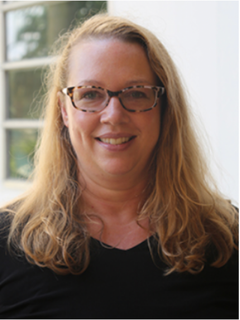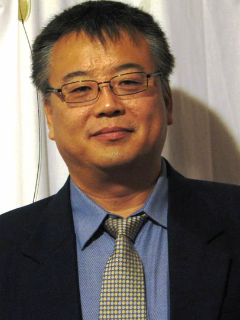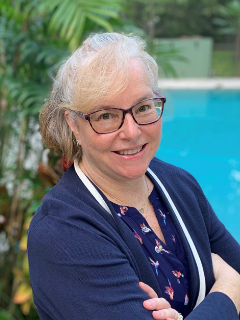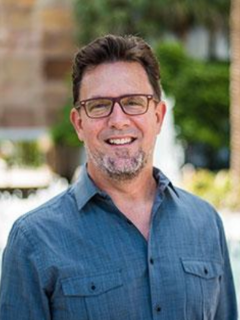Exemplar faculty are faculty who have a proven track record for excellent teaching and have a scholarly and pedagogic interest in teaching excellence. These faculty have been recognized for outstanding teaching, using and advancing new pedagogical approaches, and/or engaging scholarly works related to university teaching innovation and effectiveness. Each exemplar faculty is committed to engaging UM faculty through customized teaching support, peer consultation and feedback, and assessment and evaluation of learning. Exemplar faculty currently lead PETAL's Course Mentor program, a small group discussion program for UM faculty seeking to enhance their teaching.
Andrew Porter
Assistant Professor of Clinical, SONHS Health Studies Program
Andrew Porter is an assistant professor of Clinical at the University of Miami School of Nursing and Health Studies. His current research involves looking at how health promotion and harm reduction messages in college classrooms are disseminated through peer groups and intimate partners and how social media and podcasts change sexual health beliefs, attitudes, and behaviors. He made significant and novel pedagogical changes to his courses to help engage students in constructive and interdisciplinary dialogue in the classroom and through an educational-edutainment podcast he developed that addresses gaps in sexuality education and health disparities in the U.S. and fosters student interaction as teams and with world-wide audiences through social media.
Claire Oueslati-Porter
Senior Lecturer, College of A&S - Anthropology and Gender and Sexualities Studies Program
Dr. Claire Oueslati-Porter is senior lecturer with the Gender & Sexuality Studies Program and the Department of Anthropology at the University of Miami. She is also currently serving as interim director of the Gender & Sexuality Studies Program. She received her doctorate in Applied Anthropology from the University of South Florida. She teaches the introductory course on gender and sexuality studies, as well as a course on the anthropology of gender in the Middle East and North Africa, and a civic engagement course on the anthropology of gender and forced migration. She won the Excellence in Civic Engagement Award in 2019. In 2020, she published an ethnography based on her research on factory workers in Tunisia titled, “Gender, Textile Work, and Tunisian Women’s Liberation,” with Palgrave Macmillan. Her current research interests include research on pedagogy in gender and sexuality studies courses, the anthropology of parenting and childhood, as well as the study of gender and forced migration.
Daniel Wang
Senior Lecturer, Biology
Dr. Daniel Wang is a senior lecturer at the UM Biology Department, teaching genetics and conducting biology education research. Dr. Wang’s current research interests focus on engaging students to construct deep knowledge and develop active learning skills.
He is the recipient of the UM Excellence in Teaching Award and has been a consistent contributor to national conferences in biology education research. His research has been supported by National Science Foundation (NSF) and Howard Hughes Medical Institute (HHMI).
Miriam Lipsky
Director, Platform for Excellence in Teaching and Learning
Dr. Miriam Lipsky is the director of PETAL and an adjunct faculty member in the School of Education and Human Development. Dr. Lipsky designs and leads educational programs about diversity and inclusion, and consults with units throughout the university on programs to promote a Culture of Belonging. She has helped spearhead UM’s Intergroup Dialogue initiative, obtaining several grants to move this work forward within the university. Dr. Lipsky teaches a course for undergraduates on Intergroup Dialogue, and launched the UDialogue program on Intergroup Dialogue for faculty and staff in the fall of 2019.
In her spare time, Dr. Lipsky enjoys doing ceramics and photography, spending time with her family (the humans, as well as the dog and cat), and attending Miami Hurricanes baseball games.
Scotney Evans
Associate Professor, Education & Psychological Studies
Scot Evans is an Associate Professor in the Department of Educational and Psychological Studies in the School of Education and Human Development at the University of Miami. He is a community-engaged researcher working to understand and support the role of community-based organizations, networks, and coalitions in building collective power to promote community wellbeing, social change, and racial and social justice. He teaches undergraduate and graduate courses in community psychology, organizational development, social change praxis, community youth development, and participatory action research methods. Teaching, he believes, is about creating the conditions so that students learn to be self-reflective, self-conscious critical agents in the world.
Dr. Evans received his Ph.D. in Community Research and Action at Peabody College of Vanderbilt University and holds a master’s degree in Human Development Counseling also from Vanderbilt. He joined the UM faculty in 2008. In his role as an Associate Professor in the School of Education and Human Development, he teaches and advises students in the undergraduate major in Community and Applied Psychological Studies (CAPS), the master’s program in Community and Social Change (CSC), and the Ph.D. program in Community Well-being (CWB). Dr. Evans is the editor of the open-access journal “Collaborations: A Journal of Community-Based Research and Practice” and co-author of the 3rd edition of the textbook “Community Psychology: In Pursuit of Liberation and Wellbeing.”
Teaching, learning interests:
- Topics: community psychology, community youth development, organizational development, social change praxis, and participatory action research methods.
- Approaches: Community-engaged/service learning, experiential learning, project-based learning, narrative approaches, online teaching.
Research interests:
- Topic areas: Social change/social movement processes, power, inter-organizational collaboration, collaborative processes, community engagement, social equity (in housing, health, wages, education, climate/ environment, community development, civic participation).
- Approaches: Critical community-engaged research, community-based participatory action research, social network analysis, power analysis.








